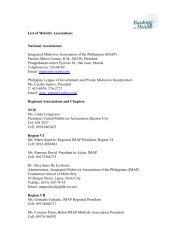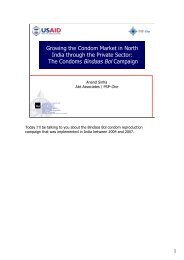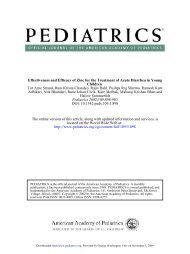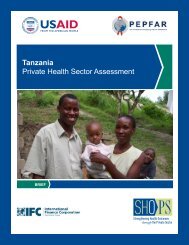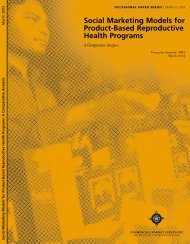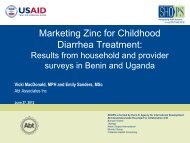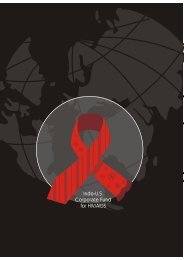Nigeria Private Sector Health Assessment - SHOPS project
Nigeria Private Sector Health Assessment - SHOPS project
Nigeria Private Sector Health Assessment - SHOPS project
You also want an ePaper? Increase the reach of your titles
YUMPU automatically turns print PDFs into web optimized ePapers that Google loves.
The lack of progress in improving national CPR can be attributed to a number of factors:<br />
• traditional values that favor large families<br />
• religious views against contraception or birth control, especially in the North<br />
• low levels of education for women<br />
• inconsistent training of providers in contraceptive technologies and counseling<br />
• weaknesses in the public-sector system and complexity in the federal system that complicates<br />
contraceptive logistics and financing<br />
Nevertheless there are encouraging messages from staff that have been working for many years in<br />
reproductive health in <strong>Nigeria</strong> (such as the International Planned Parenthood Federation (IPPF), the<br />
Society for Family <strong>Health</strong> (SFH), and Pathfinder). There seems to be broad consensus based on years<br />
of experience about the best ways to promote family planning and reproductive health. Past efforts<br />
to make the economic arguments for small families and birth control have failed and tended to create<br />
suspicions. Increasingly, practitioners agree that emphasizing the reduction of maternal morbidity and<br />
mortality makes the most compelling case for family planning to <strong>Nigeria</strong>ns. Taking this approach has<br />
quieted outright antagonism to birth-spacing messages and made it more acceptable for providers and<br />
couples to discuss contraception. Moreover SFH’s research, which showed a high correlation between<br />
couples communicating and family planning, underpins a communications strategy that should be<br />
effective for large segments of the population.<br />
The private sector has filled some of the gaps left by the public sector in supplying contraceptives to<br />
<strong>Nigeria</strong>ns, especially through the national social marketing program. The importance of social marketing<br />
and the private sector is reflected in the existing method mix which favors methods available in retail<br />
outlets such as condoms, and pills, which account for 70 percent of methods selected. The next most<br />
popular method, injectable contraceptives, is sold through the social marketing program.<br />
Figure 2: <strong>Nigeria</strong>n Contraceptive Method Mix (DHS 2003)<br />
Sterilization<br />
3%<br />
24%<br />
Pill<br />
Condom<br />
46%<br />
8%<br />
IUD<br />
19%<br />
Injections<br />
7



